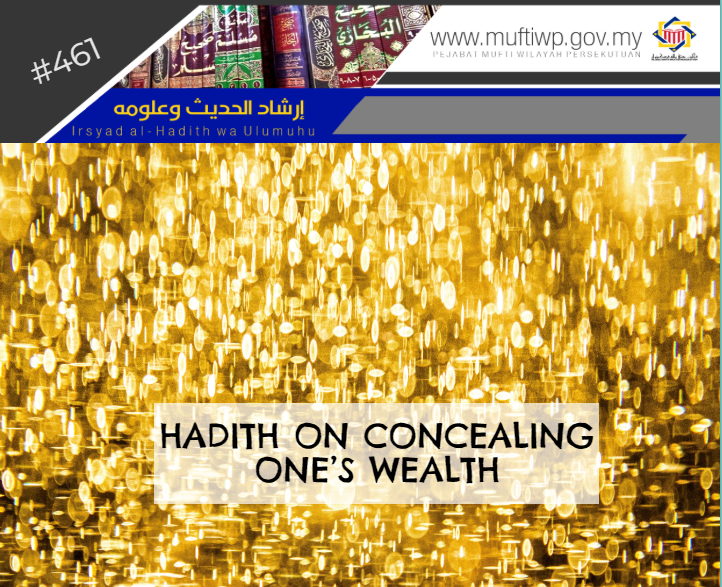Question:
What is the status of this hadith?
اسْتَعِينُوا عَلَى إنْجَاحِ الْحَوَائِجِ بِالْكِتْمَانِ، فَإِنَّ كُلَّ ذِي نِعْمَةٍ مَحْسُودٌ
“Seek help in rendering your wishes by concealing it as every person with ni’mah will be envied upon (by others).”
Answer:
Alhamdulillah, praise and thanks to Allah for the countless blessings He has blessed us all with. Blessings and salutations to the Prophet Muhammad PBUH, his wives, his family, companions and all those that follow his teachings to the day of judgement.
The Source of Hadith
Based on the above question, we would like to first state its source. This hadith is narrated by Imam al-Thabarani in all of his three Mu’jams which are al-Mu’jam al-Saghir (no. Hadith 1186), al-Mu’jam al-Awsath (no. Hadith 2455) and al-Mu’jam al-Kabir (no. Hadith 183) through the chain of Mu’az bin Jabal RA. Besides, Imam al-Baihaqi also narrated this hadith in his book Syu’ab al-Iman (no. hadith 6228) also by the chain of Mu’az bin Jabal RA. Also, Imam Abu Nu’aim narrated in his book Hilyah al-Awliya’ (5/125). Imam al-‘Uqailiy in his book al-Dhu’afa’ al-Kabir (2/108) and Imam Ibn ‘Adiy in his book al-Kamil fi Dhu’afa’ al-Rijal (4/462) all narrated by the chain of Mu’az bin Jabal RA. This hadith also comes from other chain like the chain of Ali bin Abi Thalib RA, Ibn Abbas R.Anhuma, Abu Hurairah RA and Abu Burdah by mursal narration. [See: Silsilah Ahadith al-Sahihah, 3/436]
Among the example of narration which comes from the chain of Ali bin Abi Thalib RA with different text, but almost similar in meaning is:
إِنَّ لِأَهْلِ النِّعَمِ حُسَّادًا، فَاحْذَرُوهُمْ
“Indeed, for every person with ni’mah are those who envy, so, beware of them.” [See: al-Mu’jam al-Awsath (7277)]
The Status of Hadith
Pertaining to the status of the hadith, there is some difference of opinions among scholars in stating the status of this hadith either it is sahih or dhaif. While Sheikh al-Albani evaluates this hadith as sahih. Before we conclude on the status of this hadith, here, we would like to cite some scholars’ opinions on this hadith:
Among those who evaluate this hadith as mawdu’ (fake/fabricated):
- Imam Ahmad evaluated this hadith as mawdu’ [See: al-Fawaid al-Majmu’ah, 71]
- Imam Ibn Ma’in evaluated this hadith as mawdu’. [See: al-Fawaid al-Majmu’ah, 71]
- Imam Ibn al-Jawzi ruled this hadith as mawdu’. [See: al-Mawdhu’at, 2/504]
- Imam al-Shawkani evaluated this hadith as mawdu’. [See: al-Fawaid al-Majmu’ah, 70 and 261]
- Imam al-San’ani evaluated this hadith as mawdu’. [See: al-Fawaid al-Majmu’ah, 261]
Among those who evaluate this hadith as sahih is:
- Syeikh al-Albani evaluated this hadith as sahih or hassan by the chain of Abu Hurairah RA as mentioned in his silsilah. [See: Silsilah Ahadith al-Sahihah, 3/436]
After observing some opinions above, we are inclined to state that the above hadith is very dhaif (weak) as each of its sanad is not free from critics and some narrators in its sanad are accused of being liars or fabricators of hadith. Besides, we take the approach of not detailing each chain of narrators by stating the scholars’ evaluation of each narrator to ease the understanding. Still, some scholars state that the meaning of the above hadith is true. In addition, the prohibition of disclosing the ni’mah does not come in an absolute manner. It depends on the context and physical setting. [See: al-Maqasid al-Hasanah, 112]
Besides, the meaning of hasad (envy) as mentioned by Imam al-Jurjani in his book is wishing for the removal of the ni’mah from those who he envied upon so that it may be transferred to him. [See: al-Ta’rifat, 87]
Thus, the meaning of hasad is we wish for the ni’mah of others’ and at the same time we hope that the ni’mah will vanish from those who have it. However, there is an exception as mentioned on this hadith:
- As narrated by Abdullah bin Mas’ud RA where the Prophet PBUH said:
لاَ حَسَدَ إِلاَّ فِي اثْنَتَيْنِ رَجُلٌ آتَاهُ اللَّهُ مَالاً فَسُلِّطَ عَلَى هَلَكَتِهِ فِي الْحَقِّ، وَرَجُلٌ آتَاهُ اللَّهُ الْحِكْمَةَ، فَهْوَ يَقْضِي بِهَا وَيُعَلِّمُهَا
"Do not wish to be like anyone except in two cases. (The first is) A person, whom Allah has given wealth and he spends it righteously; (the second is) the one whom Allah has given wisdom (the Holy Qur'an) and he acts according to it and teaches it to others." [Sahih al-Bukhari (73)]
According to Imam Ibn Hajar al-‘Asqalani, the meaning of hasad in this hadith is al-Ghibtoh (الغبطة) which is a wish of having the ni’mah like others without wishing those ni’mah be removed from the persons and the phrase hasad used in this hadith is a majaz (metaphorical). The wish is also said as a competition and a praiseful act if it is done towards obedience. [See: Fath al-Bari, 1/167]
Closing
In conclusion, the above hadith or narration is very dhaif as each chain (sanad) is not free from critics by the scholars. However, this prohibition as mentioned by Imam al-Sakhawi does not come in an absolute manner but depends on the situation or time setting. If there is a need in considering the situation, then it is not wrong to practice it. Lastly, may Allah SWT give us understanding in the religion as well as protect us from hasad. Ameen.
Wallahua’lam.


